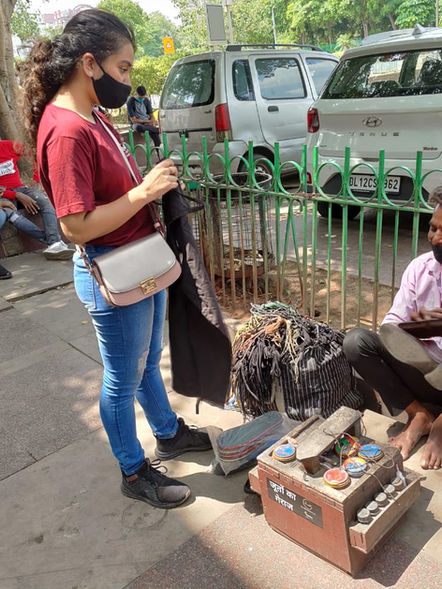
Project Raah
Project Raah was a social entrepreneurial model which aimed to provide a decent livelihood to the indigent community of cobblers and provide them hope to prosper. Under the initiative, we provided cobblers with discarded shoes from shoe manufacturing companies, who further repair, refurbish and sell them at affordable prices to the underprivileged.
Project Story
Footwear consumption has skyrocketed, with global production reaching over 20 billion pairs annually, a stark increase from 2.5 billion pairs in 1950. Yet, despite this enormous production, more than 300 million people around the world walk barefoot every day. In Delhi NCR alone, WHO reports indicate that 23% of 23 million people did not own a pair of shoes in 2016. This lack of footwear exposes countless individuals—especially barefoot rag pickers—to severe health risks. Additionally, the absence of shoes hinders adults from working and children from attending school, as the discomfort of walking becomes unbearable. With 20 billion pairs of shoes produced each year, approximately 300 million pairs end up in landfills or as marine waste, with less than 5% being recycled. Ethylene Vinyl Acetate, commonly used in shoe midsoles, can persist in the environment for up to 1,000 years, causing serious harm to our planet.
In 2017, Raah's inception was inspired by witnessing a young schoolgirl walking barefoot down a grimy street. To address the pressing issues of health, sanitation, discrimination, and waste, we devised a practical and impactful solution. Our approach involved redirecting shoe waste back into the economy through collaboration with local cobblers. Initially, we collected old shoes via donation drives at schools, colleges, and residential areas. These shoes were sorted based on condition and refurbishment needs, with most being sent to cobblers around Delhi for cleaning, repairing, and polishing.
Jooton Ka Garage
As the number of people benefiting from Project Raah grew, we established reliable sources for discarded shoes by partnering with footwear manufacturers. These companies regularly supplied us with old shoes. After refurbishment by cobblers, the shoes were sold at weekly markets, slums, and stalls with a modest profit margin. We also launched Jooton Ka Garage, a dedicated workspace for cobblers, providing them with customized t-shirts, posters, and stickers to establish a brand identity.
.png)
The garage is even listed on Google Maps, where it has garnered over 10,000 views. To further support these entrepreneurs, we offered training in soft skills and financial management, helping them manage their businesses effectively. This initiative created a win-win situation, delivering high-quality products at affordable prices and transforming roadside cobblers into independent entrepreneurs.
.png)
Zero-Waste Model
Moving towards a zero-waste model, we introduced the concept of shoe planters. Shoes which are in less than 60% repairable condition are converted into shoe plantations. These planters repurposed old, irreparable shoes as decorative items, which we sold to interior designers and theme-based restaurants and cafes.

Our Partners
Since late 2018, we collaborated with Just Sports from Jalandhar, Punjab, which provided us with discarded or defective shoes at a minimal cost. This partnership has ensured a steady supply of materials and has been instrumental in supporting our cobblers. In October 2019, Tyka Shoes, also based in Punjab, joined us as another supplier of discarded shoes. Their contributions have bolstered our supply chain and continued the cycle of recycling and reuse.
.webp)
.webp)
Our Community
Our Impact
Our Goals






.jpeg)

















